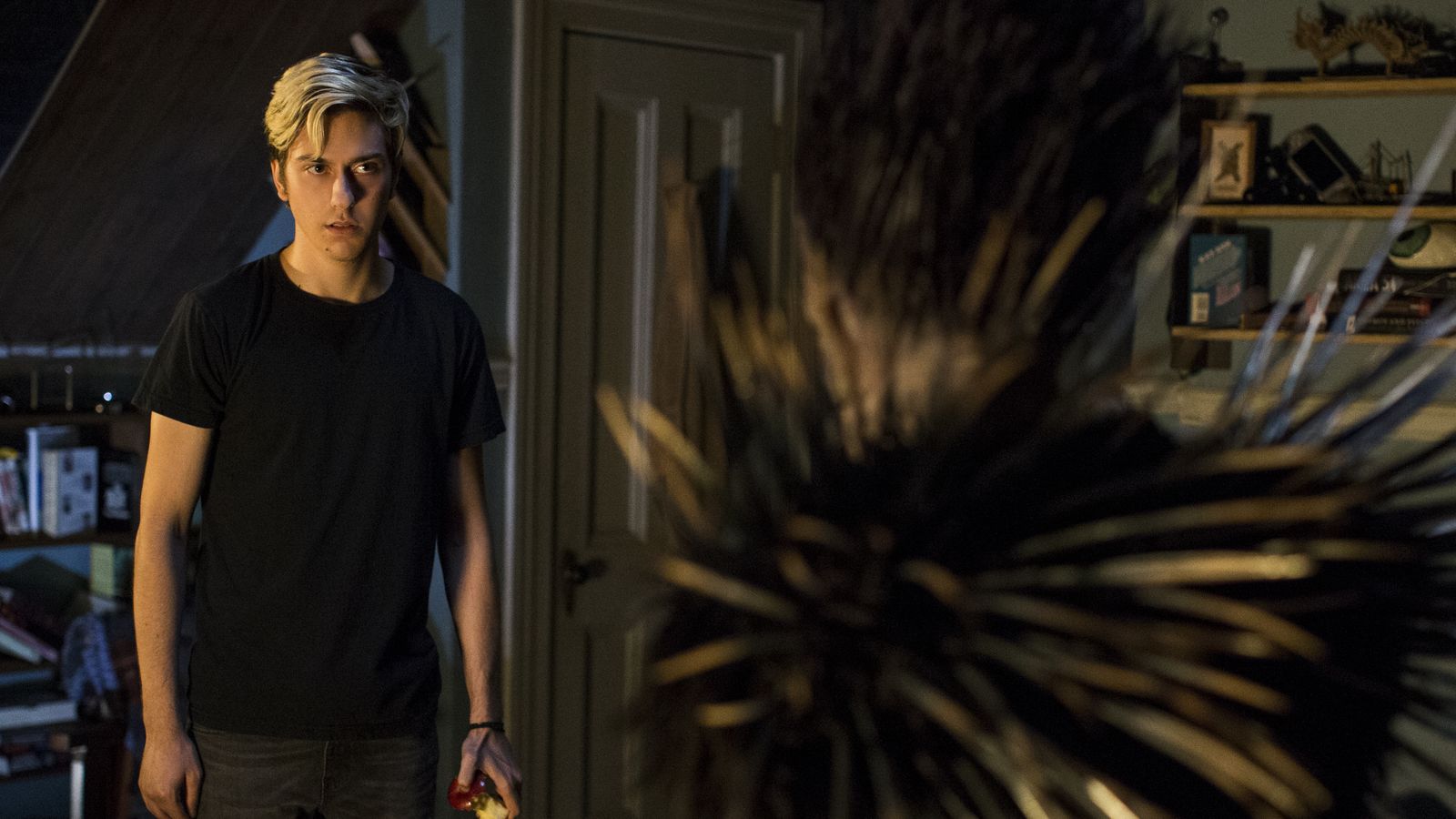“The human whose name is written in this note shall die.”
These ominous words act as the fascinating concept and tagline of the classic masterpiece anime series “Death Note” after being muttered by morally dubious protagonist Light Yagami. A genius model student inflicted with crippling ennui, Light is gifted a particularly sinister method for curing such an ailment in the form of the titular Death Note, a supernatural book that grants its author the power to kill any human provided they know their name and face. Inspired and committed to becoming the ultimate god of a new world after succumbing to temptation and testing the notebook’s abilities, Light plummets down the mass murdering rabbit hole, masquerading as a typical bright college student by day while purging the world of any known criminals after school from the comfort of his own home under the pseudonym “Kira.” Using pen, paper and a cruel yet admirable wit that even Walter White would respect, the twisted protagonist murders without leaving a trace of proof as to his guilt, becoming the world’s most infamous and untraceable serial killer with a rapidly evolving hubris to match his passion for justice.
A strikingly original idea equally elegant in its simplicity as it is in its tremendous potential for intricate storytelling, “Death Note” could have easily devolved into a splatterhouse gorefest akin to the “Final Destination” films with shallow writing in favor of spectacle over brains. However, it’s elevated to the lauded status of gripping intellectual thriller thanks to the perpetually unpredictable game of high stakes bluffing created alongside the inclusion of Light’s primary opposing force, the detective known simply by the codename “L.” As mentally brilliant as he is wildly eccentric, with a penchant for criminal psychology as powerful as his addiction to sweets, L takes on the Kira case and operates anonymously, gradually laying traps for Light to potentially fall into, each more elaborate than the last.
Of course, Light possessing no shortage of intelligence himself, the protagonist passes each test in creative and shocking ways, putting the ball in L’s court until the detective initiates countermeasures, and so on. When L eventually reveals his face to Light and openly invites him to join the Kira investigation team, the two must feign friendship while constantly engaging in verbal challenges with the other, creating some of the most suspenseful dialogue sequences to be found in the animated medium. It’s one gigantic game of cat and mouse without telling the viewer who’s the cat or the mouse at any given time; the two must attempt to capture or kill the other without knowing their real identities.
Now, Netflix has attempted to cram this entire extensive and intricately plotted series into a single hour-and-a-half long American film remake, and in crafting such an adaptation has been forced to take liberties with the original story. This is understandable and acceptable. Taking the plot in a new direction to accommodate a new medium is actually a wise decision to avoid such pitfalls as terrible pacing and inconclusive endings that commonly occur when translating these two mediums.
However, the new “Death Note” live action film utterly fails to maintain the essence of what made the original so special. The core of the series was always the intellectual warfare occurring between Light and L, such surprising and powerful characters that were an utter joy to witness interact together, truly feeling like an unstoppable force clashing with an immovable object as any great rivalry should. The new Netflix film, however, doesn’t understand what made these characters so compelling in the first place, twisting and morphing them into hollow husks of the originals, which, in turn, drains the series of its identity. The main characters of the American movie resemble Light and L in name alone; the writers utterly missed the point. This just isn’t “Death Note.”
The biggest blow is easily dealt to Light’s character, namely that this new iteration, Light Turner, as he’s referred to, is conspicuous, moronic and loses his composure far too easily, practically the antithesis to the original’s cunning mastermind. The truly frightening aspect of the anime’s Light is how easily he could disguise himself in everyday life. A bright student with a promising future, a handsome gentleman popular with the opposite sex and the son of the chief of police, nobody would expect that this seemingly mild mannered, well intentioned model citizen is secretly the criminal to end all criminals, and Light plays up this alter ego in order to further throw authorities off the scent and earn people’s trust. This leads to some expertly organized dramatic irony throughout the series. One particularly chilling sequence sees Light feigning innocence to manipulate a young widow, whose husband was a cop he killed for prying too much, into giving him her name to supposedly join the Kira task force, as she’s looking for revenge on the person who murdered her lover. This unfortunate series of events ends exactly as you would expect, and it demonstrates Light’s uncanny ability to obscure his sociopathic murderous intentions behind the facade of a respectable youth looking to enter law enforcement. It makes him both a terrifying villain and an incredibly dynamic character that’s a joy to watch weave his way out of sticky situations behind the mask of a modest boy scout.
Light Turner, on the other hand, stands out in a crowd. A grim, moody high schooler who fights with his father and remains a loner at school, this character does not resemble the warm, righteous youth with a passion for justice that Light Yagami effectively masquerades as, and thus would be easy to pick off as someone harboring malicious intent to the world around him. Not to say that loners are more likely to become serial killers, but this dude is the definition of high school edgy and unlikable, thus decimating the compelling two-faced nature of the original character by robbing Light of his ability to interact with and manipulate his contemporaries. Furthermore, the first victim he elects to murder with the notebook is the man who killed his mother, thus positioning himself as immediately suspicious (for reference, Light’s mother is alive in the anime and his family is happily cohesive, only enhancing the tragedy of his descent into psychopathy). This effectively leads into the biggest and most irredeemable flaw with this new vision of the character: Light Turner is an idiot.
Immediately upon discovering the notebook’s validity as a powerful mass murdering mechanism, he shows it to a girl at school who he’s developed a crush on in order to act upon his sexual urges and impress her. The utter stupidity of this action is endlessly vast for numerous reasons, namely that he’s revealing himself as a killer to a practical stranger for petty romantic feelings, carrying a supernatural book of death around in the open and inviting the possibility for a partnership in the killing, all actions that the original Light’s ambition, intellect and arrogance, respectively, would never let him take.
By comparison, when the anime’s version of Light discovers that the Death Note operates as advertised, he devises a trapdoor in his desk drawer where the book is being held that can only be opened with the pen that he carries, as it acts as an insulator for an electric current connected to a small container of gasoline. If someone else unwittingly opens it without knowing the proper method, Light’s device will connect the current and the desk will explode, destroying the book and any shred of evidence that could lead to his guilt along with it. Comparing the two reveals polar opposite levels of intelligence. One is hasty and brash, the other is cautious and clever. One is petty and dependent, the other is confident and ambitious. One is an angsty teenager, the other is the most powerful criminal intellect the world has ever seen.
Also, Netflix’s Light appoints himself as Kira (Light Yagami is dubbed Kira by the masses who support him, providing extra moral justification for his actions) because, in his words, “it also sort of means ‘killer’ in Japanese, so if they’re going to be looking for me, it’s going to be on the wrong continent.” Take a minute to marvel at how impressively idiotic that statement is.
L’s character is handled with more integrity, maintaining the mannerisms that provide the detective with his eccentric flair, such as eating sweets for every meal and sitting while crouched on his feet. However, for all the quirks the adaptation properly conveys, it unfortunately didn’t manage to capture the essence of what made L such a likable foil to Kira, namely his introverted awkwardness and composure in the face of certain tragedy. L is a man who hates the limelight; commonly operating behind a computer screen with a voice modifier, he only appears in public once Light forces his hand by proving too capable to handle anonymously. He doesn’t like working with others and trusts people even less; to a detective with these traits, secrecy is everything. However, the first indirect dialogue between Netflix’s L and Light sees the former delivering a public address facing hundreds of reporters in broad daylight on national television (with an American flag waving in the background, no less).
This bold depiction immediately robs the character of his iconic enigmatic persona, painting him incorrectly while entirely missing the point. L is a brilliant albeit awkward mind who works as a detective because it’s what he does best, attempting to capture Kira not necessarily because it’s for the greater good but due to his need to challenge himself; he’ll put people’s lives on the line if it means catching his prey. He’s not a hero, but he’s forced to play the part, which is distinctly separated from his introduction as a symbol of peace and justice in Netflix’s remake. The former depiction is layered and interesting, the latter promotes a good vs. evil narrative that is far too simplistic for the moral ambiguities of “Death Note.”
Furthermore, once the investigation goes sour and L loses people close to him in the film, he utterly snaps, hunting down Light with a firearm while screaming at him in a fit of hysteria. The original L would never do this, as killing Kira was never his endgame; to do so would mean losing the intellectual battle. L practically knows that Light is Kira from the beginning of the anime, his task is simply to prove it, a difficult objective when dealing with supernatural notebooks from beyond the realm of reality. In doing so, he loses many people along the way, but he rarely so much as raises his voice, as getting emotionally compromised would risk distracting away from the overarching goal; if L cracks, Light wins. To witness this vital aspect of L abandoned in the adaptation in favor of a shallow action hero is disheartening and altogether eliminates the foundation of what made the original detective such a beloved character.
The most disappointing alteration, however, is easily the interactions between Light and L, namely that there isn’t the dramatic, tense substance that molded the anime into the masterpiece it remains today. When L first confronts Light in the Netflix film, Light openly admits to being Kira immediately, meaning the aforementioned scenes of double bluffing, triple bluffing and quadruple bluffing in the anime, the high stakes game of cat and mouse filled with pitfalls to discover Kira’s true identity, simply aren’t here. The intrigue of discovering how L plans to corner Light and witnessing how the latter successfully wriggles out of harm’s way, the core essence of what made the original such a wild ride, are lost in an adaptation that instead favors action spectacles where L hunts Light with a gun.
There’s an entire arc in the anime where Light actively relinquishes the Death Note and all his memories of Kira (it makes sense in context, trust me) after volunteering to be put in solitary confinement by L until the killings stop in order to appear innocent while the Kira killings continue, thus eliminating all suspicion directed at him. However, before he does this he masterminds a scheme to ensure that the notebook and all his memories return upon his allies meeting a certain criteria, making for an endlessly clever series of events that keep the viewer guessing while demonstrating Light’s insane levels of intelligence and resolve. This masterful arc, rooted in Light’s pressing need to avoid L discovering his identity, and all story events like it, are lost in translation.
This new Netflix film takes story liberties, and that’s not a terrible idea for an adaptation to a different medium, but in doing so it loses its grasp on what made its main characters such incredible and memorable personalities to begin with while abandoning the core of the franchise’s intrigue. This isn’t “Death Note,” no matter how much it pretends to be.

















